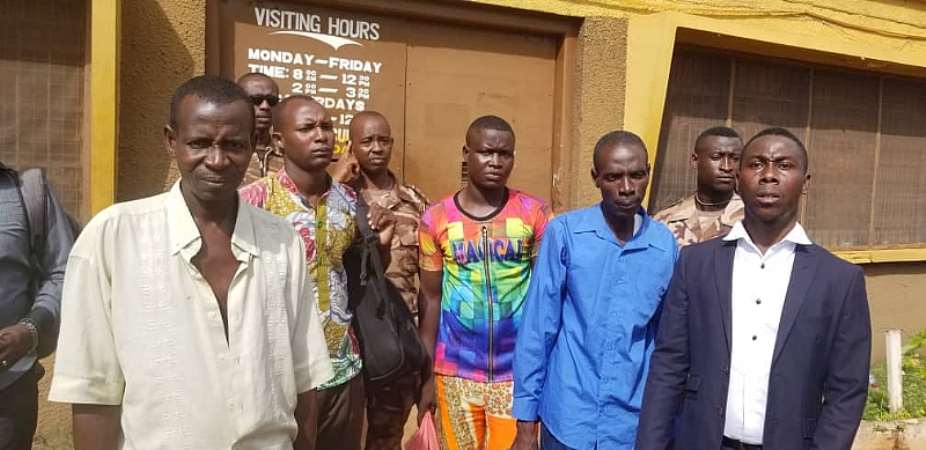Fourteen remand prisoners who have been denied fresh air for several years kissed goodbye to the walls of Sunyani Central Prisons after a Justice for All Programme which sort to reduce overcrowding at the Prisons nationwide.
They were discharged through a special in-prison court sitting held at the Sunyani Prisons by the Ghana Remand Review Taskforce made up of the Judicial Service together with the Office of the Attorney-General, the Ghana Prisons Service and Ghana Police Service as well as POS Foundation- Civil Society.
After the special court sitting, 30 inmates were granted bail, four other persons were convicted with three being imprisoned and one fined.
The Sunyani Central Prisons which is intended for 450 inmates currently has 1,372 inmates as at July 6, 2018 creating severe hardship for prison inmate due to overcrowding.
The basis for this freedom exercise is tied to Article 14(4) of the 1992 Ghanaian Constitution which declares that “a person who is arrested or detained, but has not received a trial within a ‘reasonable period of time’, is entitled to unconditional release or release subject to conditions necessary for reappearance for judicial proceedings.”
The Justice for All Programme (JFAP) is a state instituted programme, established in 2007 which seeks to alleviate prison overcrowding by setting up special in-prison courts to adjudicate remand prisoner cases throughout the country.
Funded by the Danish International Development Agency DANIDA, the JFA Programme further indicated what constitutes a reasonable time is yet to be properly determined – and it is the absence of codification of this rule which is greatly responsible for the excessive periods in which prisoners in Ghana are held without trial.
The Trigger
The 2007 Prisons Service Annual Report stated that 13,335 prisoners were held in prisons designed to hold approximately one-third of that number.
The Ghana Prisons Service statistics state that the total prison population as at Monday, February 22, 2016, was 14,534. Of that 2,464 were Remand Prisoners or on pre-trial detention, which represents 18.2 percent of the total prison population in Ghana as compared to 31.5 percent in 2007.
It is common for as many as fifty-five inmates to share a cell intended for twelve. Overcrowding contributes to the prevalence of communicable diseases. This is compounded by inadequate medical facilities and the fact that the prisons supply only the most basic medicines.
Challenges
According to the facilitators of the programme, POS Foundation, the issue of overcrowded prisons, lengthy pretrial detention remains a serious problem in Ghana.
The Foundation said sometimes detainees serve more time in detention awaiting trial than the actual sentence the crime requires. The report also indicates that pretrial detainees are frequently held with convicted prisoners.
The facilitators indicated that there is, therefore, an urgent need for civil society interventions to address the challenges faced by un-convicted detainees.
The situation which is very much alarming has necessitated this initiative “Justice For All Programme” with collaboration from the above mentioned institutions.
The Intervention
Chairman of the Justice for All Programme, Justice Clemence Honyenuga indicated that the programme targeted cases of remand prisoners and not convicts.
His comment follows criticisms that the Justice for All Programme have been releasing criminals who rather come out to commit more heinous crimes.
Justice Clemence Honyenuga commended the Sunyani Judicial Service for their support towards the programme and further ensuring that sittings are held every year.
According to the Principal State Attorney at Sunyani, Ernest Ayeh, the programme helps them retrieve cases that went stale to allow for further prosecution.
The Executive Director of POS Foundation, Jonathan Osei Owusu noted that the aim of the programme is to decongest the Prisons.
He emphasized that Zero Draft Policy (non-custodial sentencing policy) also seeks to sentence petty criminal offenders to serve the state by performing task assigned them.
 Freed Inmates
Freed Inmates






 2024 elections: Resign if you can't be faithful to party - Sagnarigu NDC PC desc...
2024 elections: Resign if you can't be faithful to party - Sagnarigu NDC PC desc...
 Five arrested, remanded over alleged murder of two police officers at Transacco
Five arrested, remanded over alleged murder of two police officers at Transacco
 Tax exemptions better than incentives for churches – Tax Analyst tell Bawumia
Tax exemptions better than incentives for churches – Tax Analyst tell Bawumia
 Transport Minister sues Law Platform Editor for defamation
Transport Minister sues Law Platform Editor for defamation
 Voter registration: Police arrest NPP Treasurer for Mpohor for registering minor
Voter registration: Police arrest NPP Treasurer for Mpohor for registering minor
 "This nonsense must stop" — Lawrence Tetteh vows to march to Jubilee House over ...
"This nonsense must stop" — Lawrence Tetteh vows to march to Jubilee House over ...
 2024 elections: “If indeed you stand for peaceful elections the time is now for ...
2024 elections: “If indeed you stand for peaceful elections the time is now for ...
 I have the attributes to be president of this country — Bernard Monarh
I have the attributes to be president of this country — Bernard Monarh
 Cecilia Dapaah saga: ‘Turf war’ between AG, EOCO, OSP indicates they’re not ‘cor...
Cecilia Dapaah saga: ‘Turf war’ between AG, EOCO, OSP indicates they’re not ‘cor...
 Ghana will become the first African country to embrace blockchain-powered gover...
Ghana will become the first African country to embrace blockchain-powered gover...
